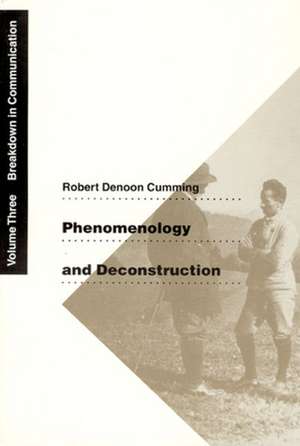Phenomenology and Deconstruction, Volume Three: Breakdown in Communication
Autor Robert Denoon Cummingen Limba Engleză Hardback – 22 oct 2001
Philosophers are committed to objective understanding, but the
history of philosophy demonstrates how frequently one philosopher
misunderstands another. The most notorious such breakdown in
communication in twentieth-century philosophy was between Husserl and
Heidegger. In the third volume of his history of the phenomenological
movement, Robert Denoon Cumming argues that their differences involve
differences in method; whereas Husserl follows a "method of
clarification," with which he eliminates ambiguities by relying on an
intentional analysis that isolates its objects, Heidegger rejects the
criterion of "clarity" and embraces ambiguities as exhibiting
overlapping relations.
Cumming also explores the differences between how
deconstruction—Heidegger's procedure for dealing with other
philosophers—is carried out when Heidegger interprets Husserl versus
when Derrida interprets Husserl. The comparison enables Cumming to
show how deconstruction is associated with Heidegger's arrival at the
end of philosophy, paving the way for the deconstructionist movement.
history of philosophy demonstrates how frequently one philosopher
misunderstands another. The most notorious such breakdown in
communication in twentieth-century philosophy was between Husserl and
Heidegger. In the third volume of his history of the phenomenological
movement, Robert Denoon Cumming argues that their differences involve
differences in method; whereas Husserl follows a "method of
clarification," with which he eliminates ambiguities by relying on an
intentional analysis that isolates its objects, Heidegger rejects the
criterion of "clarity" and embraces ambiguities as exhibiting
overlapping relations.
Cumming also explores the differences between how
deconstruction—Heidegger's procedure for dealing with other
philosophers—is carried out when Heidegger interprets Husserl versus
when Derrida interprets Husserl. The comparison enables Cumming to
show how deconstruction is associated with Heidegger's arrival at the
end of philosophy, paving the way for the deconstructionist movement.
Preț: 483.82 lei
Preț vechi: 621.67 lei
-22% Nou
Puncte Express: 726
Preț estimativ în valută:
92.61€ • 100.63$ • 77.84£
92.61€ • 100.63$ • 77.84£
Carte indisponibilă temporar
Doresc să fiu notificat când acest titlu va fi disponibil:
Se trimite...
Preluare comenzi: 021 569.72.76
Specificații
ISBN-13: 9780226123707
ISBN-10: 0226123707
Pagini: 280
Dimensiuni: 152 x 229 x 28 mm
Greutate: 0.57 kg
Ediția:1
Editura: University of Chicago Press
Colecția University of Chicago Press
ISBN-10: 0226123707
Pagini: 280
Dimensiuni: 152 x 229 x 28 mm
Greutate: 0.57 kg
Ediția:1
Editura: University of Chicago Press
Colecția University of Chicago Press
Notă biografică
Robert Denoon Cumming is the Frederick J. Woodbridge Professor Emeritus of philosophy at Columbia University. He is the author of Human Nature and History, Starting Point: An Introduction to the Dialectic of Existence, and Phenomenology and Deconstruction, Volumes One and Two, all published by the University of Chicago Press.
Cuprins
Introduction: Difficulties in Communication
1. The Two Traditions
2. Disciples
3. Fellow Workers
4. The Work of the Other
Procedures
5. The Shift in Subject
6. The Shift in Method
7. The Retrieval
8. The Translation
Deconstruction
9. Destruktion
10. The Edge
11. The Boundary
The Sign
12. The Ambiguity
13. The Indicative Sign
14. The Indicator
Relational Analysis
15. The Context
16. Der Weg Der Abhebung
17. Umgang
18. Ausgang
Being-In
19. Concept Construction
20. Aufgehen In
21. Psychologism
22. The Theory of Knowledge
Communication
23. Language
24. The Monologue
25. The Public Reckoning
Conclusion: The End of Philosophy
Notes
Works Cited
Index
1. The Two Traditions
2. Disciples
3. Fellow Workers
4. The Work of the Other
Procedures
5. The Shift in Subject
6. The Shift in Method
7. The Retrieval
8. The Translation
Deconstruction
9. Destruktion
10. The Edge
11. The Boundary
The Sign
12. The Ambiguity
13. The Indicative Sign
14. The Indicator
Relational Analysis
15. The Context
16. Der Weg Der Abhebung
17. Umgang
18. Ausgang
Being-In
19. Concept Construction
20. Aufgehen In
21. Psychologism
22. The Theory of Knowledge
Communication
23. Language
24. The Monologue
25. The Public Reckoning
Conclusion: The End of Philosophy
Notes
Works Cited
Index
